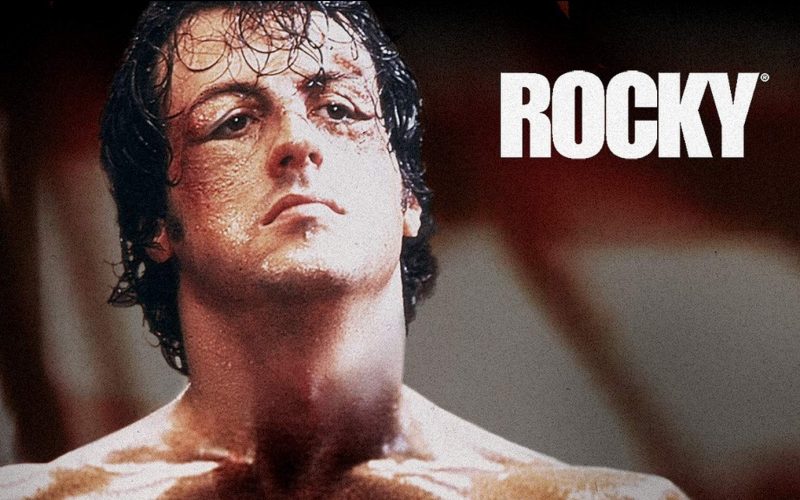Rocky (1976)

Released in 1976, “Rocky” is a seminal American sports drama film that has left an indelible mark on both the film industry and popular culture. Directed by John G. Avildsen and written and starring Sylvester Stallone, “Rocky” stands as a testament to the power of perseverance, ambition, and the human spirit. With its compelling story, unforgettable performances, and stirring themes, the film not only captivated audiences upon its release but also solidified its place as a classic in cinematic history.
The narrative of “Rocky” follows the journey of Rocky Balboa, a small-time boxer from Philadelphia who gets a once-in-a-lifetime opportunity to fight for the heavyweight championship of the world. Sylvester Stallone, who also wrote the screenplay, portrays Rocky with a combination of raw intensity and vulnerability. Balboa is an underdog with a heart of gold, working as a debt collector by day and training as a boxer by night. His life takes a dramatic turn when Apollo Creed, the reigning heavyweight champion, selects Rocky as his opponent for a high-profile bout after his original contender is injured. The story focuses on Rocky’s preparation for the fight, his struggles, and his quest to prove himself not just to the world, but to himself.
Sylvester Stallone’s performance as Rocky Balboa is central to the film’s emotional impact. Stallone brings a depth and authenticity to the character, capturing Rocky’s determination and resilience. His portrayal of Rocky is both physically and emotionally demanding, showcasing a wide range of emotions from the character’s initial struggle and self-doubt to his eventual triumph. Stallone’s dedication to the role is evident in his physical transformation and his commitment to delivering a performance that resonates with audiences on a personal level.
John G. Avildsen’s direction plays a crucial role in the film’s success. Avildsen’s approach is grounded and realistic, allowing the raw intensity of the story to shine through. The film’s gritty portrayal of Philadelphia, coupled with its realistic boxing sequences, creates an immersive experience for the audience. Avildsen’s direction is complemented by the film’s cinematography, which captures both the personal and professional aspects of Rocky’s life. The camera work effectively conveys the struggles and triumphs of Rocky’s journey, enhancing the emotional depth of the narrative.

The film’s score, composed by Bill Conti, is another standout element that contributes to its lasting impact. The iconic theme song, “Gonna Fly Now,” has become synonymous with the film and serves as a powerful symbol of Rocky’s determination and perseverance. The music plays a significant role in motivating both Rocky and the audience, adding an inspirational and uplifting quality to the film’s most memorable scenes.
“Rocky” also features a strong supporting cast that adds depth to the story. Talia Shire, as Adrian Pennino, Rocky’s love interest, delivers a heartfelt performance that highlights the emotional support and growth she provides to Rocky. Burt Young’s portrayal of Paulie, Adrian’s brother and Rocky’s friend, adds a layer of complexity and authenticity to the film’s depiction of relationships and personal struggles. Additionally, Carl Weathers as Apollo Creed brings charisma and intensity to the role, providing a formidable challenge for Rocky and adding to the film’s dramatic tension.

The film’s themes of resilience, self-belief, and the pursuit of personal goals resonate deeply with audiences. “Rocky” is not just a story about boxing; it is a universal tale of overcoming obstacles and striving to achieve one’s dreams against all odds. The film’s portrayal of Rocky’s journey, both in and out of the ring, serves as a powerful metaphor for the human experience, inspiring viewers to face their own challenges with courage and determination.

Upon its release, “Rocky” was met with critical acclaim and commercial success. The film garnered several Academy Awards, including Best Picture, Best Director, and Best Editing, and earned Stallone nominations for Best Actor and Best Screenplay. Its success was not limited to awards; “Rocky” resonated with audiences worldwide, becoming a cultural touchstone and influencing countless films in the sports drama genre.
In conclusion, “Rocky” is a landmark film that continues to inspire and entertain audiences more than four decades after its release. Directed by John G. Avildsen and written and starring Sylvester Stallone, the film’s compelling story, memorable performances, and powerful themes make it a timeless classic. Through its portrayal of Rocky Balboa’s journey, “Rocky” exemplifies the triumph of the human spirit and remains a testament to the enduring appeal of a well-crafted underdog story.










